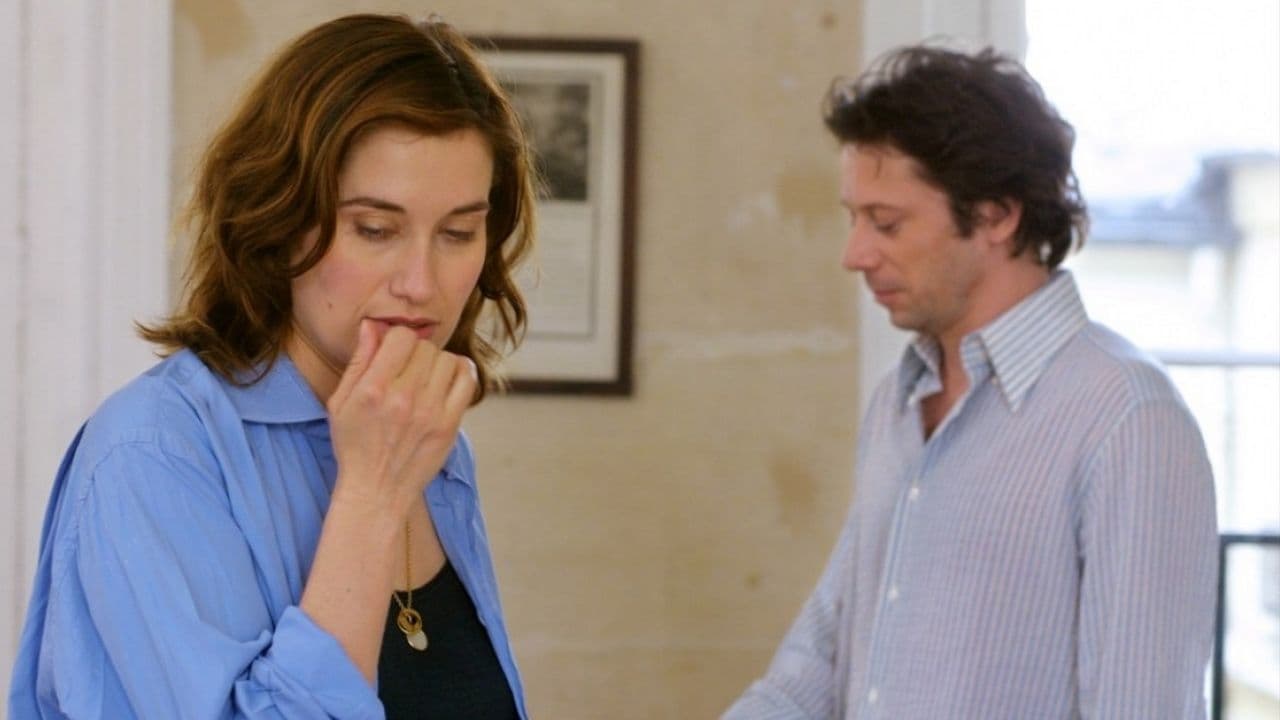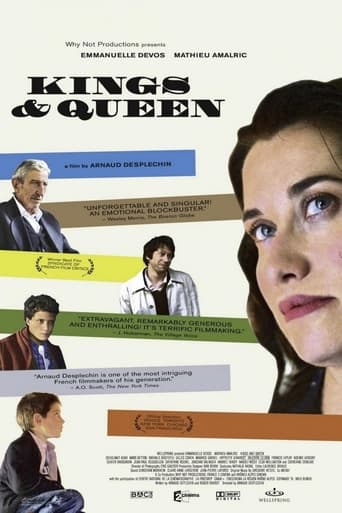



What a waste of my time!!!
This movie was so-so. It had it's moments, but wasn't the greatest.
View MoreI really wanted to like this movie. I feel terribly cynical trashing it, and that's why I'm giving it a middling 5. Actually, I'm giving it a 5 because there were some superb performances.
View MoreIt's simply great fun, a winsome film and an occasionally over-the-top luxury fantasy that never flags.
View MoreThe death of a loved one is never pretty, but may be particularly hard in our atomic age; the news of an ailing relative is a bolt from the blue, external to our everyday lives. And unlikely people can make good parents, exactly because being a good parent is not something you achieve by following instructions. These are the sort of thoughts provoked by watching 'Kings and Queen', a French movie about a woman with a dying father, a mad ex-lover and a teenage son. There are definitely some perceptive moments, but overall, the film is a bit uneven; the two halves of the plot (one centred on the woman and her father, the other on her ex) are quite disconnected and also distinct in tone: the former cool and reflective, the latter somewhat riotous; although they come together at the end, this doesn't quite feel like a necessary ending, while other plot lines (such as one centred on the lead character's sister) are not developed. Still, I liked the movie's insight into the selfishness of modern lives and attitudes, which fall short of evil but lie exposed as inadequate under duress: there's a message in this which many could heed.
View More"Kings and Queen" is a bloated French drama that rambles on for an interminable two hours and thirty-two minutes to no discernible point or purpose.The film features two stories that seem unrelated at first but which eventually connect with one another about halfway through the movie. The first centers around Nora and her struggles with various men in her life, including an elderly father who discovers he has only a few days left to live. The other story involves a young man named Ismael, a violinist who finds himself placed - unfairly, he believes - in a mental institution through the machinations of an unknown third party. After traveling along on separate tracks for awhile, these two narrative strands eventually come together when we learn that Ismael is a former lover of Nora's and the man she has chosen to adopt her son from an earlier, tragic relationship.With a bit more focus and a considerable amount of streamlining, "Kings and Queen" might have been a potent, engrossing drama about modern day relationships. It certainly has moments of tremendous insight and emotional power, and the performances are, for the most part, complex and touching. But, taken as a whole, the film meanders and maunders to such an extent that, quite frankly, it begins to wreak havoc on our patience and to wear out its welcome early on. Even more distressing is the fact that, even though we spend what seems like a mild eternity in the company of these people, we really don't know quite what to make of any of them when the show is finally over. For instance, Nora's father, on his deathbed, writes a withering diatribe against his daughter's character that simply doesn't gibe with the woman we've been looking at for well over two hours. Nora is admittedly no Mother Theresa (then, again, who is?), but she certainly doesn't deserve the invective thrown at her by her very own father. Nora could be accused of being confused, indecisive, a bit self-absorbed at times, but evil enough to have her father wishing he could give her his cancer and make her die in his place? I don't think so.Perhaps this film is simply operating at a level of depth that I was unable to fathom. But my suspicion is that even writer Roger Bohbot and co-writer/director Arnaud Desplechin would have trouble fully explaining their purpose here. This is a well acted, pretentious bore of a film that takes the viewer on a long, rambling voyage through a sea of personal crises, a journey that leaves him no wiser or more enlightened at the end than he was at the beginning.
View MoreThere is SO much going on in this film, but it has rhythm, pace, a great soundtrack, and enjoyable, charismatic performances, that kept me engaged from the word go. The editing owes something to 60s Godard - lots of jump cuts in the dialogue scenes - and 80s Rohmer - anguished 30 somethings worrying about true love - and possibly, in its tour de force final sequence, a reference to La Jetee, which is also of course about memory, fate, and mortality. And then there is the rather bizarre Audrey reference which opens the film: as Nora steps out of a black car, clutching her morning coffee, clothed in black, her hair wound up on her head, the strains of Monn River sound. So far, so post-modern. This is is a film that is freighted with filmic, literary, theatrical (esp Shakespeare and the Tempest) and artistic allusions, but that uses these in service of a specific point: that these cultural references and allusions make the web of our being - that art is how we communicate to each other (notice that all the characters communicate through art - the gift Nora gives her father, the music Ismael dances to, the book the father writes - even the 'murder scene' is filmed through a highly stylised mise-en-scene): that 'artifice' can reveal the deepest and most moving of human emotions. It is a beautiful film that will move you and make you leave the cinema feeling transported. And Deneuve is just great! I love the bit where Ismael asks her if anyone has ever told her she's beautiful, and she gives a slight twist of her lips, sighs, and says, yes, she has heard that before. Just because something has become cliché, doesn't mean it's not true.
View MoreNora (the devastating and luminous Emmanuelle Devos) is a single mother who suddenly has to care for her dying father (a successful writer straining to put the finishing touches on his last book, a memoir of sorts) on the eve of marrying her new suitor. Ismael (the fantastic Mathieu Amalric) is her "ex-boyfriend" who cared for her son most of the boy's life, and is a struggling musician who suddenly finds himself trapped in the loony bin thanks to an over-zealous sister, a bitter friend, and a "judicial error." Director Desplechin (this is the only film I have seen of his) does a nice job flipping back and forth between the utter bleakness and emotional hell of caring for a dying parent, and the absurd serio-comic-horror of being stuck in the "crazy hospital" against your will. There's a lot of play with psychoanalysis (highlighted by Catherine Denueve in a bit part as a psychiatrist) that is fun and illuminating to watch. There's speckles of romance, dark humor, nihilism, magic realism, and soap opera theatrics with lots of references to philosophy, mythology, and poetry that keep the film interesting and unpredictable even as its over two and a half hour run time tries your patience. There are plenty of revelations and big emotional payoffs here punctuated well with eclectic music choices (everything from classical pieces to some sort of catchy European hip-hop) and nice little surprises (Magalie Woch is delightful as the lovely suicidal mental patient who becomes smitten with Ismael). This utterly French film gives the viewer a lot to chew on, even if you have to gnaw through a bit of gristle before dining on the filet mignon.
View More